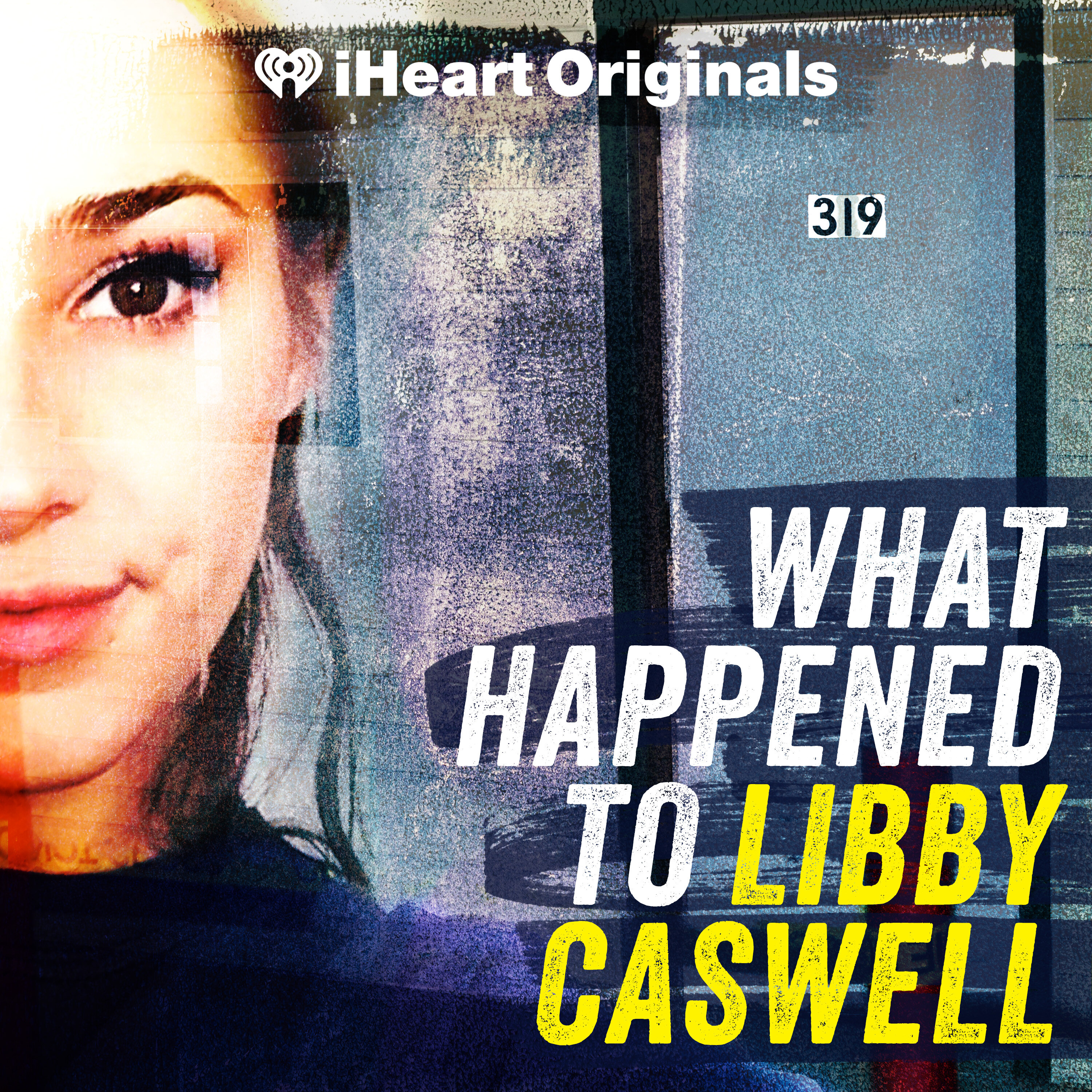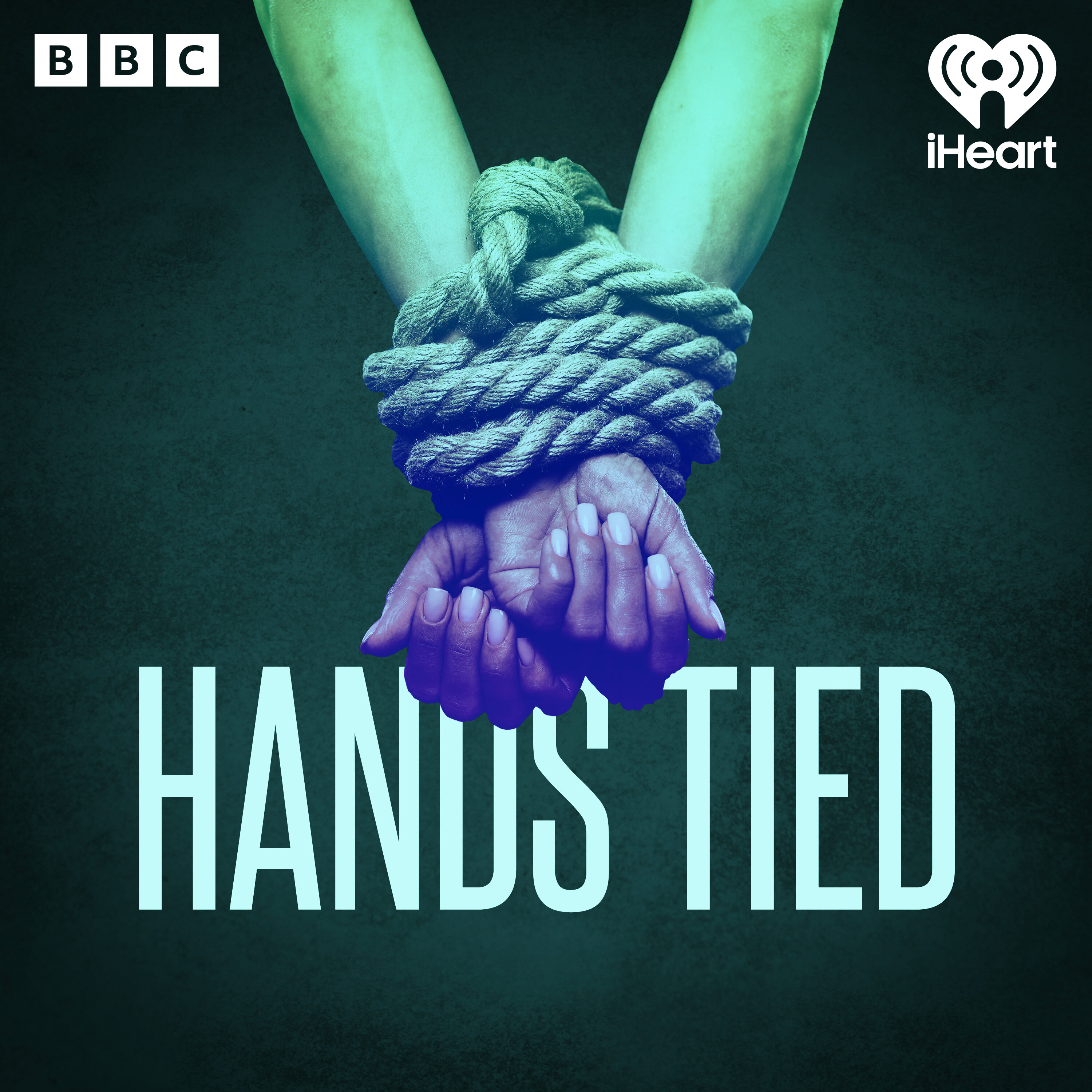Nuisance laws — Libby Caswell BONUS
The nuisance law in Independence, Missouri played a pivotal role in Libby's story. In this bonus episode, hear Melissa's extended conversation with Sandra Park, former ACLU lawyer and current head of the Civil Rights Bureau of the NY State Attorney General’s Office, as they discuss what nuisance laws are, how they're often misused and what's being done about them.
See omnystudio.com/listener for privacy information.
Listen and follow along
Transcript
This is an iHeart podcast.
Stop settling for weak sound.
It's time to level up your game and bring the boom.
Hit the town with the ultra-durable LG X-Boom portable speaker and enjoy vibrant sound wherever you go.
Elevate your listening experience to new heights because let's be real, your music deserves it.
The future of sound is now with LG X-Boom.
And for a limited time, save 25% at lg.com with code Fall25.
FALL25.
Bring a boom.
X-Boom.
Life's messy.
We're talking spills, stains, pets, and kids.
But with Anibay, you never have to stress about messes again.
At washable sofas.com, discover Anibay Sofas, the only fully machine-washable sofas inside and out, starting at just $699.
Made with liquid and stain-resistant fabrics.
That means fewer stains and more peace of mind.
Designed for real life, our sofas feature changeable fabric covers, allowing you to refresh your style anytime.
Need flexibility?
Our modular design lets you rearrange your sofa effortlessly.
Perfect for cozy apartments or spacious homes.
Plus, they're earth-friendly and built to last.
That's why over 200,000 happy customers have made the switch.
Upgrade your space today.
Visit washable sofas.com now and bring home a sofa made for life.
That's washable sofas.com.
Offers are subject to change and certain restrictions may apply.
This is Andrea Gunning from Betrayal.
Are there two sides to every story?
Academy Award nominee Robin Wright stars in The Girlfriend on Prime, a psychological thriller that will make you question everything.
Laura has the perfect life and a son she'd die for, but when he brings home his new girlfriend Cherry, played by Olivia Cook, something feels off.
Also starring Laurie Davidson, The Girlfriend is a twisted game of cat and mouse where nothing is what it seems.
Don't miss the girlfriend, streaming now exclusively on Prime.
Sometimes the truth is just a matter of perspective.
This is Bowen Yang and Matt Rogers from Los Culturistas with Matt Rogers and Bowen Yang.
This episode of Los Culturistas is brought to you by Malibu.
501 shouldn't just mean the end of work, it should mean the beginning of fun.
Yes, with a Malibu cocktail, it's like a mini vacation without ever getting on a plane.
Because you deserve to unplug, disconnect, and live in the moment.
I love to enjoy cocktail with my friends at a local watering hole, a classier bar, or at home.
I'm going to say it, the beach could be an amazing place to drink.
Clock off with Malibu because life's too short not to do whatever tastes good.
Sip easy.
Enjoy Malibu responsibly.
Copyright 2025 imported by Pernod Ricard, USA, New York, New York.
Here's something good on women's health and longevity, a new podcast on iHeart.
Join us for conversations with renowned medical experts.
They'll share the latest breakthroughs, the good news about women's health, and the simple steps women can take to help them live healthier and happier every day.
Be sure to listen to our episode, Period Power, where we explore how menstrual health is foundational to lifelong well-being and how accurate information can shape health outcomes across a lifetime.
Brought to you by Tampax, found at Walgreens, the women's well-being destination, supporting every stage.
Listen to hear something good on women's health and longevity on the iHeartRadio app, Apple Podcasts, or wherever you get your favorite shows.
Hi, listeners.
In this bonus episode of What Happened to Libby Caswell, I want to spend some time talking about nuisance laws, what they are, how they're used, and what's being done about them.
The nuisance law in Independence, Missouri played a pivotal role in Libby's story.
You may remember from episode 3 that Cindy's house was labeled a nuisance after she repeatedly called 911 to report Devin's ongoing harassment.
I always thought nuisance was the person that didn't clean up the trash or mow their grass or had loud late night parties.
I didn't think it pertained to, hey, help us here.
Help us.
This kid is egging our house.
He's, you know, threatening us.
The logic of this, that they were being punished for Devin's threatening behavior, confused and angered Cindy.
Yes, it was a nuisance.
It was a very big nuisance, but it was to us too.
You know, we were struggling to keep our daughter safe and our other two kids and trying to hold down jobs, you know, at the same time.
I first heard about nuisance laws in 2017 when I was a reporter for the Huffington Post.
I covered a story where a woman was evicted from her home and ultimately exiled from her hometown of Maplewood, Missouri for calling to report domestic violence on multiple occasions.
At the time, I interviewed Saundra Park, who was then a lawyer with the ACLU.
They brought a lawsuit against Maplewood, arguing that their nuisance law was unconstitutional.
As a result, the town was forced to amend its nuisance ordinance so that domestic violence victims could no longer be penalized for calling the police.
Saundra Park is now the head of the Civil Rights Bureau of the New York State Attorney General's Office.
I reached out to her recently to talk about the nuisance ordinance in independence and its effect on Libby's tragic story.
Here's our conversation, which has been edited for length and clarity.
I think most people don't even know about nuisance laws or nuisance ordinances.
So it would be great just to hear from you a little bit of a backstory of when and where they originated and for what purpose.
So nuisance laws exist around the country.
There have been different types of laws like this on the books for decades.
They became much more popular in the 90s as a result of tough on crime type attitudes where people started penalizing minor offenses as a way of possibly getting at bigger offenses.
So almost like a broken windows theory.
Typically, when you see justifications of these laws, there's a simplistic idea that somehow once you start penalizing owners for police calls or for possible criminal activity occurring at the home, that somehow the landlord or the owner can stop that from occurring.
And I think that's just a completely misplaced idea about what the relationship between crime and the home is.
particularly if you think about the domestic violence context, domestic violence by its nature is usually committed at the home.
And so, once you have a law that is targeting the fact that there's a 911 call or that there's a crime occurring at the home, you are going to punish the victim of the domestic violence.
I think survivors in that situation quickly learn that reaching out for police assistance will not provide any sort of safety or security to them.
What are the justifications for these types of policies?
And what specific offenses are they looking to crack down on?
It seems like sometimes it's about noise or like trash or other stuff like that, but what typically when policymakers have pushed these policies, like what are they saying to justify why they might be helpful?
So early on, there were a lot of ordinances that were more general to physical conditions at the home, like things like trash or dead trees.
Those are not the types of ordinances that I've been concerned about or, you know, have been advocating against.
What we saw was a broadening of the scope of these ordinances over time, particularly in this 90s period that I mentioned earlier, where you saw things like drug offenses potentially being targeted.
You saw violence being targeted without any consideration of who was committing the violence, whether the person was actually the victim of the violence.
Just the fact that violence had occurred at the home was going to make that property a target for nuisance enforcement.
And then we also saw that rather than specifying offenses, a lot of cities took a very broad approach to these ordinances where they would say any violation of federal, state, city law can trigger this nuisance ordinance.
And it could be as minor as a violation.
So something very low level as an offense.
And that is actually, I think, very typical of the way these laws operate now.
The other types of justifications in the domestic violence context in particular is we've seen victim blaming explicitly in some of the consideration of these types of laws.
So you'll see discussion of the fact that there are repeated domestic violence calls, that you know that's a problem for the city and they want that to stop.
And rather than actually trying to address the underlying issues of domestic violence in the home, they want to crack down on the fact that there are repeated calls.
And so they are taking an extremely punitive approach by punishing the folks who are generating those calls.
I think that the other really flawed philosophy behind this type of ordinance is that somehow if you reduce the number of police calls that equates to reducing crime and we know that's just completely a huge mistake.
If anything, you are allowing crime to continue to occur and violence to escalate because people no longer feel that they can reach out for emergency assistance.
Do we have any research or understanding about how these might be unequally enforced?
Yeah, we've done that analysis in specific communities in different ways, and we've seen that they disproportionately get enforced when the calls are about domestic violence.
We definitely have seen in the nuisance ordinance context where they seem to be disproportionately targeting people of color, people with disabilities, as well as households dealing with domestic violence.
So, do you think it was intentional for domestic violence to be considered a type of nuisance, or was this just a byproduct of the laws?
When I first started working on this issue, I maybe naively thought it was more of a byproduct situation.
And, you know, the evidence really shows that it is very explicit victim blaming in a lot of communities.
I'm not going to say every community, but we have seen in some communities they specifically target domestic violence as a nuisance offense, or they specifically talk about domestic violence as a type of offense they want to target in adopting this type of ordinance.
Stop settling for weak sound.
It's time to level up your game and bring the boom.
Hit the town with the ultra-durable LGX Boom portable speaker and enjoy vibrant sound wherever you go.
Elevate your listening experience to new heights because let's be real, your music deserves it.
The future of sound is now with LG XBoom.
And for a limited time, save 25% at LG.com with code Fall25.
Bring the boom.
X-Boom.
Time for a sofa upgrade?
Visit washable sofas.com and discover Anibay, where designer style meets budget-friendly prices.
With sofas starting at $699.
Anibay brings you the ultimate in furniture innovation with a modular design that allows you to rearrange your space effortlessly.
Perfect for both small and large spaces, Anibay is the only machine-washable sofa inside and out.
Say goodbye to stains and messes with liquid and stain-resistant fabrics that make cleaning easy.
Liquid simply slides right off.
Designed for custom comfort, our high-resilience foam lets you choose between a sink-in feel or a supportive memory foam blend.
Plus, our pet-friendly stain-resistant fabrics ensure your sofa stays beautiful for years.
Don't compromise quality for price.
Visit washable sofas.com to upgrade your living space today with no risk returns and a 30-day money-back guarantee.
Get up to 60% off plus free shipping and free returns.
Shop now at washablesofas.com.
Offers are subject to change and certain restrictions may apply.
Lily is a proud partner of the iHeartRadio Music Festival for Lily's duets for type 2 diabetes campaign that celebrates patient stories of support.
Share your story at mountjaro.com slash duets.
Mountjaro terzepatide is an injectable prescription medicine that is used along with diet and exercise to improve blood sugar, glucose, in adults with type 2 diabetes mellitus.
Maljaro is not for use in children.
Don't take Maljaro if you're allergic to it or if you or someone in your family had medullary thyroid cancer or multiple endocrine neoplasia syndrome type 2.
Stop and call your doctor right away if you have an allergic reaction, a lump or swelling in your neck, severe stomach pain, or vision changes.
Serious side effects may include inflamed pancreas and gallbladder problems.
Taking Maljaro with a sulfinyl norea or insulin may cause low blood sugar.
Tell your doctor if you're nursing pregnant plan to be or taking birth control pills and before scheduled procedures with anesthesia.
Side effects include nausea, diarrhea, and vomiting, which can cause dehydration and may cause kidney problems.
Once weekly Manjaro is available by prescription only in 2.55 7.5 10 12.5 and 15 milligram per 0.5 milliliter injection.
Call 1-800-LILLIRX 800-545-5979 or visit mountjaro.lily.com for the Jaro indication and safety summary with warnings.
Talk to your doctor for more information about Mount Jaro.
Mount Jaro and its delivery device base are registered trademarks owned or licensed by Eli Lilly and Company, its subsidiaries or affiliates.
This is Andrea Gunning from Betrayal.
Are there two sides to every story?
Academy Award nominee Robin Wright stars in the girlfriend on Prime, a psychological thriller that will make you question everything you think you know.
Laura has the dream job, the perfect husband, and a son she'd die for.
But when her beloved Daniel brings home his new girlfriend Cherry, played by Olivia Cook, something feels off.
Is Cherry the sweet, innocent girl she appears to be?
Or is there something more manipulative beneath the surface?
And how far will a mother go to protect her son?
Also starring Lori Davidson, the girlfriend is a twisted game of cat and mouse where nothing is what it seems, and everyone has something to hide.
Don't miss the girlfriend, streaming now exclusively on Prime.
Sometimes the truth is just a matter of perspective.
There's a lot going on in Hollywood.
How are you supposed to stay on top of it all?
Variety has the solution.
Take 20 minutes out of your day and listen to the new Daily Variety podcast for breaking entertainment news and expert perspectives.
Where do you see the business actually heading?
Featuring the iconic journalists of Variety and hosted by co-editor-in-chief Cynthia Littleton.
The only constant in Hollywood is change.
Open your free iHeartRadio app, search Daily Variety, and listen now.
If you've listened to the entire podcast, and I recommend you do before going any further, you know that the Independence Police Department used a local nuisance ordinance to pressure Cindy to stop calling them despite Devin's ongoing harassment.
When I first read how the police described their interactions with Libby in their reports, I was horrified.
For example, here's one incident.
On August 12th, 2013, Cindy called 911 to report Devin swinging a hammer outside her house.
By the time police arrived, he was nowhere to be found.
The responding police officer wrote in his report that, quote, Dispatch advised that IPD had responded to the address five times in August 2013 for disturbances and building checks all pertaining to Devon.
Each time IPD has responded, Elizabeth has been very uncooperative, end quote.
This was the moment IPD decided to cite Cindy and Libby for maintaining a nuisance property, and it would have ripple effects for months and years to come.
I showed the reports to Sandra Park to get her expert interpretation.
It struck me that there was no discussion of referrals for services, that they seemed focused on the fact that the alleged victim was very uncooperative rather than, you know, thinking about how they could better work with her, better talk with her.
And, you know, that that is the kind of language we see where police are turning towards blaming the victim rather than thinking about ways of supporting the victim.
This is a very stark situation of that because
when the officer notes her as being uncooperative, that's the very same instance where they then turn around and serve her parents with maintaining a nuisance residence.
So it's very clear that they believe that this family is causing a nuisance rather than being deserving of support.
Law enforcement is clearly aware that it's a domestic situation.
You know, they're labeling some of these calls domestic disturbance, and that is often often the way police departments code these types of calls, which I think raises another question, you know, whether the disturbance language frames these situations more in a nuisance type situation, right?
Versus calling it like, I don't know, some other terminology where we would recognize the dynamics of domestic violence or abuse happening.
So we've gone from the summer to the next January.
She calls the police again.
And just the language here of the police.
I advised both Caswell women that police were not going to make continual calls to the residents and it would be treated as a disorderly house and parties could be arrested on future calls.
After a stern warning and conversation, I elected not to arrest Libby Caswell.
I thought like, wow, she was actually being threatened with arrest in that case.
Yeah, I mean, that really was horrifying to see.
I think the timeline you're thinking through is very similar to what I've seen in other situations, where once the family understands that future calls will lead to enforcement, they stop calling.
Typically, they may make calls again in the future only when they feel they really have no other choice or when the violence has escalated to a point that they don't see any other way of addressing it.
So it's not surprising to me that there might have been a gap.
I think the law is set up to punish families in this situation.
And
then we see in stark terms that the police are enforcing or understanding the law to do that by stating that continual calls could lead to the arrest of the people who are making the calls, even though they themselves are not alleged to have committed any criminal activity.
For me, I mean, this issue has always been so disturbing because I really think it's writing into law blaming the victim because the victim can then be arrested for having made these requests for police protection.
So in your work specifically with domestic violence and these laws, can you talk a little bit about how these nuisance laws affect victims of domestic violence and the different ways that it affects them in terms of housing, financially,
safety?
I know that that they probably have a cascading amount of effects, but I'd love to hear just what you've seen firsthand.
I've worked with many survivors who have been targeted under these laws over the years.
I think one thing to note is for many survivors, the decision to call the police is a very heavy one, and they often will have experienced violence.
for some period of time, often lengthy periods of time, before they make that first 911 call.
I'm thinking of one survivor I worked with who experienced domestic abuse for seven years before she made her first 911 call.
And when she made that call, it was in a city where there was a nuisance ordinance.
That first call triggered enforcement against her home.
First, she learns that actually calling 911 and seeking protection will mean that she loses a home for her and her kids.
Second, she learns that law enforcement, which is often understood by most of society as where survivors are supposed to go to seek protection, that instead of providing safety, they will threaten your housing and possibly impose other types of financial and criminal consequences because your call for help is considered a nuisance under the local law.
I think what's most difficult for survivors in this situation is that as a society, we generally have sent the message that people who are experiencing domestic violence should call the police and should seek protection.
And,
you know, survivors, when they then do that, to learn that they are going to be punished in this way really undoes any sense of there being a foundation of security or safety that they could turn to.
And I think They really then learn that they are very much on their own, which they might have thought even before this.
And so if you imagine a person in that situation who suffered for many years, the message that sends is devastating.
Can you talk a little bit about the legal concerns with these laws and how you might have challenged them in the past?
Sure.
So I've worked on several lawsuits challenging these laws around the country.
Because these laws, the way they operate, is to punish people once they make the call to the police.
We think that's a very clear violation of people's First Amendment rights, which includes the right to contact law enforcement and to request assistance.
And we now have decisions from various courts recognizing that when these laws operate to punish people for their 911 calls, that is considered a violation of their First Amendment rights.
We've also challenged these laws on due process grounds because
usually there really is no process for someone to contest whether they should be punished under these laws.
There's no hearing, there's no opportunity for the family to talk about why they shouldn't be punished.
It's just an automatic assumption that if you violate the law, you will get whatever the penalty is.
And then we've also challenged these laws on the grounds that they discriminate against women.
We know that in many communities, domestic violence is the biggest category of police calls.
So once you start enforcing based on calls to police, you are harming domestic violence survivors, the majority of whom are women.
What we've seen is as a result of our cases, the cities have repealed the laws and paid damages to our clients.
We've also used the lawsuits to spur on state legislation, as well as we now have a new federal protection of the Violence Against Women Act.
So it sounds like the lawsuits that you have worked on when they've been successful have resulted in these ordinances being repealed.
Are we seeing like a move towards getting rid of these ordinances or really only the ones that you've brought a hammer down on have actually made any change?
It's varied.
A lot of times our lawsuits have helped support state legislation, which prohibits local laws that punish residents for seeking emergency assistance.
It's an ongoing project because, you know, we're talking locality by locality.
And so that's why we've taken these approaches of trying to focus on state and federal level protections.
We have seen cities repealing or amending their ordinances, but it's a continuing conversation about educating folks that these ordinances exist.
At the federal level, the latest Violence Against Women Act includes a protection that applies to cities that receive federal funding through the Community Development Block Grant Program, which is a pretty widespread program.
And basically, it creates protection from being penalized under ordinances for seeking emergency assistance or for criminal activity of which you are not at fault.
It might not address every situation, but the way penalty is described is that you should not be penalized by being evicted, by not having your lease renewed, or by other types of fines and fees or criminal consequences.
I I know we've discussed this, but just sort of just big picture what kind of message it sends to victims to be treated as a nuisance, even this language of nuisance.
I mean, I think about kind of the shame that Cindy has a little bit around the fact that she was fined, had to go to court, you know, this is not a wealthy family and had to pay money for really seeking help that was, you know, and it was unsuccessful.
You know, this did not stop the harassment that this family was getting.
Yeah, I mean, in talking to survivors, I've heard over and over again the hurt and the sense of abandonment that they feel once they learn that the city where they live is labeling the violence and abuse they're experiencing as a nuisance.
And even beyond that, that they are labeling the survivor as a nuisance.
It's a very personal insult, but beyond that, it's really a sense of complete abandonment as well as
understanding that your city is further victimizing you, because it's not just that the police are failing to provide you with emergency protection.
It goes way beyond that, that they are actually threatening you with punishment that will only make you further vulnerable to the violence you were experiencing in the first place.
And so I think for many survivors, it's a realization
that they are not only alone in dealing with the violence, but that they also have to keep that violence secret from the police.
In March 2021, after learning that a nuisance ordinance had been used against Cindy's family, Casey Gwynn and Alliance for Hope International sent a letter to Eileen Weir, then Mayor of Independence, asking her to revoke the statute.
She never responded.
In late 2023, Alliance for Hope sent another request to the new Mayor of Independence, Rory Rowland.
They're still waiting to hear back.
What happened to Libby Caswell is written, reported, and hosted by me, Melissa Jeltson.
This episode was written by Marissa Brown and edited and mixed by Jeremy Thal.
Our executive producer is Ryan Murdoch.
For iHeart Podcasts, executive producers are Jason English and Katrina Norvell with our supervising producer Carl Cadel.
Our theme song is written by Erin Kaufman and performed by Aaron Kaufman and Elizabeth Wolf.
Original music by Aaron Kaufman with additional music by Jeremy Thal.
To find out more about my investigation or to send a tip, please email me at whathappenedtolibby at gmail.com.
Thanks so so much for listening.
Stop settling for weak sound.
It's time to level up your game and bring the boom.
Hit the town with the ultra-durable LGX Boom portable speaker and enjoy vibrant sound wherever you go.
Elevate your listening experience to new heights because let's be real, your music deserves it.
The future of sound is now with LGX Boom.
And for a limited time, save 25% at LG.com with code Fall25.
Bring the boom!
X-Boom!
Let's be real.
Life happens.
Kids spill.
Pets shed.
And accidents are inevitable.
Find a sofa that can keep up at washable sofas.com.
Starting at just $699,
our sofas are fully machine washable inside and out.
So you can say goodbye to stains and hello to worry-free living.
Made with liquid and stain-resistant fabrics.
They're kid-proof, pet-friendly, and built for everyday life.
Plus, changeable fabric covers let you refresh your sofa whenever you want.
Neat flexibility?
Our modular design lets you rearrange your sofa anytime to fit your space, whether it's a growing family room or a cozy apartment.
Plus, they're earth-friendly and trusted by over 200,000 happy customers.
It's time to upgrade to a stress-free, mess-proof sofa.
Visit washable sofas.com today and save.
That's washable sofas.com.
Offers are subject to change and certain restrictions may apply.
Ah, smart water.
Pure, crisp taste, perfectly refreshing.
Wow, that's really good water.
With electrolytes for taste, it's the kind of water that says, I have my life together.
I'm still pretending the laundry on the chair is part of the decor.
Yep, here you are, making excellent hydration choices.
I do feel more sophisticated.
sophisticated.
That's called having a taste for taste.
Huh, a taste for taste.
I like that.
Smartwater.
For those with a taste for taste, grab yours today.
Your drive powers your day.
Now let it power change in your community too.
And when it comes to helping children in the Bay Area, Shell can keep your kindness rolling.
When you fill up at the Purple Giving Pump at Shell, a portion of your purchase is donated to charities like the California Fire Foundation.
Download the Shell app to find your nearest giving pump, less than two miles away.
Because giving back doesn't cost you you extra.
From September 1st to October 31st, participating shell stations will donate a minimum of one cent per gallon of the fuel pump from the giving pump or a minimum donation of $300.
Running small and medium-sized businesses is tough work.
Business owners need to be sure that their ads are working just as hard as they do.
Amazon streaming TV ads makes your marketing dollar go even further.
With Amazon ads, trillions of browsing, shopping, and streaming insights help small and medium businesses reach the right customers that matter.
Your ads can show up during the shows customers are actually watching, and measurement tools show you what's working the best.
Gain the Edge with Amazon Ads.
This is an iHeart podcast.





